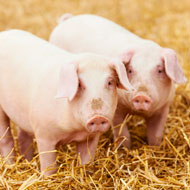Pioneering project aims to improve pig health

It is hoped the project will be "a catalyst for innovation in the pig farming industry".
A pioneering project has been launched with the aim of finding out how technology could be used to improve pig health and wellness.
The $3 million project will be carried out by a consortium of UK animal health and academic partners, led by animal health company Zoetis.
Over 42 months, researchers will develop visual imaging methods and digital technologies to analyse pig behaviour and performance. It is hoped the technologies will be able to pick up signs of stress and disease, meaning treatment and care can be achieved at an earlier stage than previously.
Teams from Newcastle University will offer expertise in both veterinary science and digital technology. Ilias Kyriazakis, professor in animal health, said he hopes the project will be "a catalyst for innovation in the pig farming industry", both in the UK and across Europe.
"Armed with these data, veterinarians, animal scientists and producers can focus more on preventive medicine and health strategies to capture production efficiencies, making the most of finite resources."
Researchers will aim to build upon a video imaging system, QScan, that monitors weight gain in pigs. Currently used in the UK, Europe, USA, Canada, Brazil and China, was developed by Innovent Technology Limited, who are part of the consortium.
Alejandro Bernal, executive vice president at Zoetis, said: "By combining resources and sharing expertise, we can speed advances in animal health and support livestock veterinarians and producers as they strive to limit disease and increase productivity in their animals to supply increasing global demand for high quality meat."



 The latest
The latest